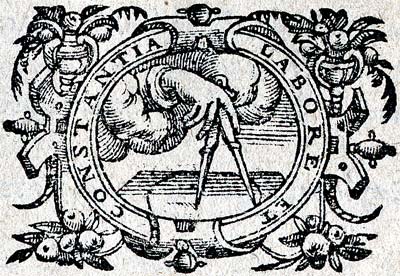The title page is comparatively simple; many title pages of this period are ornate. The page has several distinct sections.

Sancti patris nostri
Epiphanii, episcopi Constantiae Cypri, ad Physiologum.
Eiusdem in die festo Palmarum sermo.
Our holy father
Epiphanius, bishop of Constantia in Cyprus, concerning
the Physiologus.
Also a homily on the feast day of Palm Sunday.
The title appears in both Greek and Latin, and indicates that the book is a series of texts either attributed to Epiphanius or about him. Two of the texts are named: the Physiologus and the homily on Palm Sunday.

There is an error in the Greek form of the title: the word printed as ΕΡΙΦΑΝΙΟΥ should be ΕΠΙΦΑΝΙΟΥ. It has been corrected by hand in an ink similar to that used to correct some page numbers.

D[?] Consali Ponce de Leon Hispalensis, S[anctissimo]
D[omino] N[ostro]
Sixti V. Cubicularij secreti, interpretis &
scholiastae, bimestre otium.
D[?] Consalus Ponce de Leon of Spain, Our Most Holy
Lord
Sixtus V. Chamberlain secret, interpreter &
scholar, of two months leisure/idleness.
Consalus Ponce de Leon is identified as being from Spain, and as the chamberlain of Pope Sixtus V. He is also the translator of and commentator on the text. The phrase "bimestre otium" translated here as "of two months leisure/idleness" may mean that this book was the product of two months free time Ponce de Leon had; the poem below may also be a reference to this.

Otio qui nescit uti, plus negoti habet,
quam cum est negotium in negotio.
This is a quote from from the Iphigenia of Quintus Ennius (239–169? BCE). It is from the "soldiers' chorus" beginning at line 234, where the soldiers are complaining of their idleness as they wait to go into battle, saying that it is like being suspended between peace and war.

The printer's mark of Christopher Plantin, one of several that he used. Most included the symbol of the "golden compass" and Plantin's motto "Labore et Constantia" (Labor and Constancy).

Antuerpiae,
Ex Officina Christophori Plantini
Architypographi Regij.
M. D. LXXXVIII
Antwerp,
From the office of Christopher Plantin,
Royal printer.
1588
This is Plantin's standard statement, used on most of the books he printed. "Architypographi Regij" is a title given to Plantin by the king (Philip II of Spain); he was at one time responsible for regulating printers in Antwerp. Plantin continued to use the title from then on, even after the position was officially abolished.
